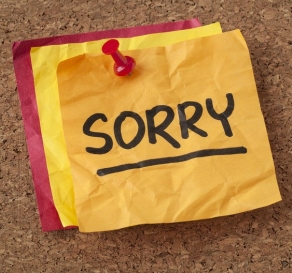Many people today promote what might be called a ‘culture of apology.’  If we say or do something that causes offense, particularly offense to a person that belongs to a marginalized group, we’re told that the only possible response is abject confession of the wrong we have done and unqualified expressions of remorse. We’re told that “impact is greater than intent.” We must not protest that our motives were innocent. We certainly must never claim that there was nothing objectively wrong with our words or actions. We’re told that these responses are not only misplaced, but that they are expressions of arrogance and the desire to dominate.
If we say or do something that causes offense, particularly offense to a person that belongs to a marginalized group, we’re told that the only possible response is abject confession of the wrong we have done and unqualified expressions of remorse. We’re told that “impact is greater than intent.” We must not protest that our motives were innocent. We certainly must never claim that there was nothing objectively wrong with our words or actions. We’re told that these responses are not only misplaced, but that they are expressions of arrogance and the desire to dominate.
Of course, ‘offense’ is a difficult subject that requires a great deal of nuance. Sometimes, we say things that expose truly evil attitudes in our heart; if so, we should not just apologize, but repent. Other times, our words testify to our indifference or carelessness. But in other cases, our words caused offense not because we harbored ill-will or because we lacked sensitivity, but only because our hearer did not like the claims we were making. In this essay, I am thinking only of these latter cases, cases in which we said and did nothing objectively wrong, but caused offense despite speaking truthfully and appropriately.
Many sincere, humble people recognize that this reflexive demand for apology is misguided but feel obliged to accommodate it. They reason “What can it hurt? Why not simply apologize to soothe the other person’s feelings so that we can move on? Why not prioritize the relationship over what is -in the end- a minor request?”
I understand this reaction, but I think it underestimates the dangers involved. I’d like to suggest that if we have not done anything objectively wrong and know that to be the case, then offering an apology as if we had done something wrong has several serious problems:
- We are lying. There’s no getting around this fact. If we know that we have not done wrong, but publicly confess to doing wrong, then we are a liar. We are solemnly intoning what we know to be false. That, itself, is gravely wrong.
- We are undermining our trustworthiness. If I publicly confess to wrong that I have not done with a quaver in my voice and a sincere expression on my face, what conclusion will be drawn by people who know my actual beliefs? The next time I publicly repent for a real moral transgression, can they be sure that I am sincere? Or am I just play-acting again?
- We are showing the world that we can be manipulated. Although the offended person may be sincere, the next person may not be. Once it is known that I will bow to public pressure and ignore the truth, what is to stop an intentionally deceptive person from taking advantage of my willingness to compromise?
- We are patronizing the person who has wrongly taken offense. Hear me clearly. There are cases where they are right to take offense. There are other cases that are ambiguous. But there are some cases where the offended party is, objectively, either oversensitive or plainly in the wrong. Yes, we are fallible human beings with blind spots who need to be open to correction. But so are they. Ironically, to insist that a marginalized person is so emotionally wounded that they can’t be held accountable to reason is to insult their agency. We are implicitly saying: “the grown-ups will soothe your feelings; we know you can’t control them.”
While I agree that we should be constantly open to correction, that we’re often blind to our own failings, and that we should always listen with humility to rebuke, I think that this ‘culture of apology’ is not only wrong but actively dangerous. We are minimizing the importance of honesty. We are building a world of facade and pretense. And we are creating an environment in which bad actors can force compliance under threat of public shame.
Certainly, there is a segment of our culture that delights in offense and provocation and they should be opposed. But we shouldn’t run to the opposite extreme. Let’s speak the truth in love. The truth, whether it causes people to applaud or to hiss. In love, whether people praise us or despise us.
Related articles:
- Important Articles on Critical Theory
- Critical Theory – All Content
- The Language of Social Justice: A Friendly Rejoinder to Joe Carter
- Cultural Marxism and Critical Theory – A Friendly Response to Ameen Hudson